Neglected Poets Anthology
Here’s a mini-anthology of the six Neglected Poets I have profiled so far on this blog.
*
Edward Smith (1939-2003)
d.a. levy (1942-1968)
Donald Schenker (1930-1993)
Rebecca Parfitt (1942)
Charles Potts (1943)
George Hitchcock (1914-2010)
*
Send me your nominations for the next batch. Already in mind: Charles Foster, Joe Gastiger, Mary Norbert Körte, Jack Grapes, Morton Marcus, Flora Arnstein, Sharon Doubiago, and, because Jack said “thee and me, my friend!” Jack Foley and, naturally, myself. Send dates, bio info and poems or URL with your nominations, if you have ’em.
*
*
Edward Smith (1939-2003) was born to missionary parents in China, and
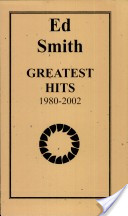
There is no image among the .jpeg's supplied to me in all good faith by Google for one of America's greatest poets, Edward Smith.
mastered Vietnamese in about five minutes when the CIA sent him in-country in ’63. Ed became fluent enough to startle the eponymous Bea of Bea’s Wok ‘n Roll in DeKalb, Illinois, with his proficiency four decades later. He was spirited out of Saigon overnight on the heels of the assassination of Ngo Dinh Diem. Ed Smith was the dominant hippie poet in 1967 Seattle in a scene that included Charlie Potts, then underwent an unfortunate conversion conjugal with whiny first wife to childhood Evangelical Christianity which cost him thirty years of poetic work that would have made his name. Smith returned to the craft around the millennium. He approached Potts and began to rev up his axe once more, drove all night to DeKalb in August 2003 to bore Rebecca Parfitt and me to tears ranting against nefarious and irrelevant Roethke while finishing her Bailey’s Irish Cream, appeared at the Walla Walla Poetry Party that fall and wowed ’em, and got the flu Xmas 2003 and died because he didn’t have health care. Ed Smith is a rapid, submarine didactic poet with great expanse and large male pattern blindness. Smith taught Potts the art of the assonant rant, or maybe they both learned it from Dorn. This is a late poem, from his comeback tour, for his older daughter.
***
Father & Daughter
*
for Lindsay
*
Divina & Heather Ferreira,
her aunt Shani Benesh
& boxes
of mostly naked Barbies
Jim Buerster’s mouth reflected
in a Matthias Grunewald picture
printed from the Internet in black & white—
Lindsay gripped it in her hand
to lay on Mrs. Kuebel
before the bells
even years after the ultrasound
showed us a girl growing
in Sindy’s tummy
###
I’m not a real man
I tell my friends sometimes
just to be funny, I don’t
golf, fish, hunt
I detest action movies
dislike fast cars,
in fact, all cars
adore quiche, salads
yellow cheese, red wine
oboes & romantic comedies
###
and yet I am a man
in the wash of a daughter’s love
frantically clinging to my arms
when the answers don’t come out right
& she cries out, “skip, skip!”
to get me to move on without an answer
evading the unpleasantness of
not knowing everything at six
###
& Lindsay, when you come some-
day to lock horns with the truth
remember the closeness of a man
who pulled you up
through fights, colds, changes
of schools, friends, your
body rounding to all
things full & sweet sixteen
for when a boy will zoom
you outa here, maybe
in a white Mustang
as in Suzy Bogguss’ “Cinderella”
your nighttime fears forgotten
in the prospects of another
young man’s toast
and yet
before you finally go
remember the man
who pushed you high
on swings
& whose curved arm
welcoming yr little
female nature to his heart
was all you knew
Edward Smith
***
***
d.a. levy (1942-1968) was understood among the poets
of the mid-to-late 60’s underground to be the most American important poet of his, and my generation. A Cleveland boy who graduated high-school entirely without distinction — his one entry in the 1960 Rhodes High School yearbook is the phrase “Hey, You!” — levy took it amiss that Cleveland didn’t have a world-class poetry scene and undertook to create one via mimeograph and coffee house. Not surprisngly, levy was busted by the Repub D.A. for reading obscene poetry to minors (the 16-year-old chick in the second row was bugged, and I do hope she’s had a happy life). Allen Ginsberg came to levy‘s aid in the grand benefit reading. levy was a telepath, a pain freak, chained to Cleveland as a Dog Warrior ties himself to a stake on the battlefield. His most important work is the North American Book of the Dead. The weight of the evidence suggests that levy sat in lotus the day after Thanksgiving and blew his brains out.
***
turn away
i have nothing to say
in all this darkness
everyone runs from
words that carry light
from the closed doors
of the mind
i have nothing to say
why don’t you just sit there
and die
a little
everyday
waiting for some naive
child carrying the
crippled bird of yr love
to say the things you are
afraid to say & perhaps
in a millennium or two
you will begin to understand
that naive child
was you
and you murdered him
in the darkness
d.a. levy
***
***
Donald Schenker (1930-1993) had a poetic career of sorts in the Bay Area, but is now forgotten except by a few deep friends. Don came out West from natal Brooklyn, married blonde artist Alice from Wisconsin, resented Ferlinghetti and Rexroth, started a successful business (the Print Mint) and practiced his chops in recurring jazzy neurotic uncommanding poems until the day in 1985 when he got the diagnosis. Don sold the business and had eight years as a great poet. He spent as much time as possible in a cabin up in Siskiyou County where he wrote all his best work — Up Here, High Time, and The Book of Owl. He got to be a grandpa before the cancer took him away. Don Schenker and I were close the last two years of his life, and I treasure that.
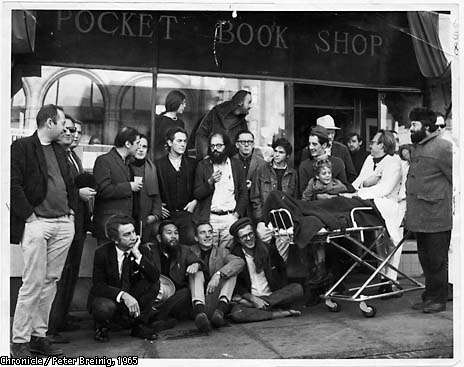
Claim to fame: Don Schenker's the rube standing on the far left in this iconic 1958 portrait of SF Beat poets. Shig is seated, and Lew Welch and Peter Orlofsky; among those standng are David Meltzer, Allen Ginsberg and Richard Brautigan (in the white hat).
Jorge Luján, the músico ambulante, asked me for some poetry to read at bedtime, “algo fresco, lúdico” and I gave him Schenker; Jorge’s deft translation of most of Don has had the same curious unsuccess in getting published in Argentina as Scenker has had posthumously here. Dorianne Laux, happily not a ngelected poet, will tell youhow good Don was. Schenker‘s late poems are his good as Robert Creeley’s early poems, while his early poems are as empty as Creeley’s later work. That’s bad career timing.
***
Noon at Bear Meadow
*
We were on our separate ways
to the meadow, the bear and I.
We were going to meet there.
*
He was going to stand up
and open his arms
and I was going to walk in.
*
In the middle of the meadow,
in the middle of the day,
nobody there but him and me.
We thought we’d try it.
*
But something happened.
He got there early and didn’t wait,
and I came late.
*
He was leaving as I arrived
and never looked back.
I stood and watched him go
and never called out.
*
I went back every day after that
for a long time.
Then every month, then every year.
*
In the center of the meadow at noon
I’d sink down into the grass,
close my eyes in the bright sun
and think about how close we came,
the bear and I.
Donald Schenker
***
Here’s my own elegy for Donald Schenker, written after we went out for Vietrnamese in downtown Oakland and first published inPoetry Flash.
After all I’m neglected too (“I’m Nobody! Who are you?/ Are you Nobody too?”) In her lifetime, Emily was neglected. Now she isn’t.
*
ALL OVER THE PLACE
*
—for Donald Schenker (1930-1993)
*
Don says there’s poems all over the place,
it’s practically embarrassing, and I nod
without enthusiasm, driving into downtown
Oakland thinking yeah, those two pigeons
squatting on the blue-gray sign HOTEL MORO,
how the part of it that’s a poem could fall out
between the word and the bird, or the word Moro
all the way back to the reconquest of Spain
and all the bloody hemisphere ending up
on this block I don’t care if I see again.
*
Don says he could just stop anyone
and look at them, they’re all so deep
and beautiful, and I say what’s interesting
is the stories they all carry around
stranger than fiction, stronger than truth
all these gente waiting to cross the street
each one forgetting their great-grandparents
each one forgetting to tell their children
and I’m no novelist, I can’t move a
character across the room, much less two guys
to lunch at a Vietnamese place on Webster.
*
Over bowls of translucent noodles and odd meat
Don says he always felt like the other poets
were the big boys, and I see how the grand
famous names of his peers, now pushing sixty
have turned into the padded artifacts
of their own careers, while Don’s obscurity
has kept him fresh and sweet, and Don says
he loves his tumors, the big one that hurts
in his left hip, the one that’s hammering out
among sparse hairs inside his baseball cap,
and though it’s his own death that gives him truth
I’m stuck in my heart without any words
while poems in Vietnamese are fluttering up
from all the restaurant tables around us
and escaping into so much empty light.
John Oliver Simon
*
Rebecca Parfitt (b. 1942) is my girlfriend, which raises the nepotism factor. It occurred to me there were no women on my list. Most of the best student poets, aged now about 3 – 52, I have worked with, are women. Maybe women don’t typically follow the Smith-levy-Schenker trajectory of the ambitious but truncated career. Becky‘s path is more typical of women: she never made a serious effort to establish a poetic reputation, has written a few gleaming poems in a life devoted to service to battered women, participates in a terrific writing group in DeKalb (whose dominant poet — she will hate that formulation — is Joe Gastiger), publishes occasionally, and is basically fine with that. Unfortunately, WordPress’s debvotion to the left margin won’t allow me to reproduce the elegance of how this poem, written upon seeing her first image of the being who became her granddaugher Lila, spreads pleasingly across the page.
***
After the Ultrasound
*
for my grandchild
*
All night it rained softly
all night the seals pop their shiny heads
up out of the water and look softly
at me
We lean over the boat railing
Look, seals! The children swimming!
Look!
*
I will bring you to the water
I will sing you songs of nonsense & longing
We will walk the cliffs
naming the flowers as we go
*
darling minnow
deep sea explorer
jutting knee of you
tiny throbbing heart of you
pebble knobs of spine of you
fingers fluttering toward your mouth
(just wait until you taste peaches)
pinpoint toes oh my little seal
the wonder of it!
Rebecca Parfitt
***
***
Charles Potts (b. 1943) is a force of nature. His dad was a fur trapper in Idaho; Charlie was a high-school basketball star who met Ed Dorn in Pocatello, Ed Smith in Seattle, and me and Richard Krech in Berkeley. In the apocalyptic Bay Area spring of 1968, Charlie wrote and read and promoted at white heat on caffeine, nicotine, drugs, and no sleep or food until he flipped over the line into Napa State Hospital, a painful transition he eidetically chronicled in his memoir Valga Krusa.
For many years Charlie has maintained an alternative Pacific Northwest poetry tradition through The Temple bookstore and magazine in Walla Walla, Washington. Hed rushed to the scene to be of support and assure the safety of manuscripts when Ed Smith died. There is a rock band named after him: the Charles Potts Magic Windmill Band. Charlie sometimes tours with them. Ron Silliman is one of Charlie‘s fans. It is entirely strange to me that there is an entire huge poetic universe that wouldn’t naturally name Charles Potts as one of America’s five most important poets. Go figure.
*
Fu Hexagram 24 No Hangups
*
Charlie Potts is dead
And I wonder if I should
Be opening his mail
Just as though it had
Been addressed to me
By all his friends
*
And for him as well as me
I tell you I have gone
All the way with Charlie
Back to nothing
And the cycle is complet
Ed
By the highest sound
I every heard
Going around in circ les
My name is Laffing Water
And whatever form it takes
I have plenty of
*
Changes to go through
Before I outwrite
All my errors
In longhand Legge’s English
10 year trip
With the further suggestive note
10 may be a round
Number
Signifying
*
Or
It
Long time
No see
The waiter laid on Crash
in North Vancouver
When we went in to have us
Front us a meal
Chinese English
Keeps my head up
The farthest north
I’ve been
*
Though sometimes I feel trapped
With so many other
Ugly Americans
Locked in English
Long time — no see
The blind embrace the blind
The deaf the dumb
The dead the living
Let go of me
*
I may not be one
with everything
But I am one with me
And you are 2
And we are 3
And 4 is cool
And 5 is plenty
Let’s get higher
Let’s get higher
One times nothing
Is nothing
Is me
Times it
For it is nothing
And I am it
And everything’s nothing
Belongs to you
Are part of it
Doesn’t make any difference
Whether or not I’m one
With the phone book
Dial a thought
Psycho somatic music
*
I’m completely inside
Your head now
But you can relax
For I won’t be long
And I’m not dangerous
Nor habit forming
But in case you’d dig to know
Why the sound is coming
Out of your mouth
And into your ears
Ventriloquy
Subtitled
Throwing my voice
*
You can relax completely now
I’m back in my corner
And it came with me
On the 7th day
it all returns
We got very close io it
Before it got away
But it’ll be back
The Sabbath started
With life one and is going
To last ’til dark
Today
As always
‘Cause it is
A band of invisible
4 space astral light
We find ourselves
In paradise
*
Are you ready for this
Have we been here before
But how did it end
It never ends
Mind expansion
The verb for all corrections
Think
About
The petering out of Pleistocene
The sun whips
Guided by
The magnificent completion
Of the next galactic cycle
And the final
Ice age
We passed through
With rudimentary tales
Down the Kelvin scale
Into ground
Zero
Which is the round number of
The largest perfect circle
How the genes knpw
What you all did
Greedy motherfuckers
I can be happy with nothing
Remember
Every step you take
Is in the right direction
And it’s not recorded anywhere
If everything is true
This match will sparkle
***
***
I didn’t really know the Santa Cruz Surrealist poet George Hitchcock (1914-2010) very well. Our paths crossed briefly in his active great age when I published our mutial friend the Baja California poet Raúl Antonio Cota (Hitchcock wintered in later years in La Paz). Hitchcock — a former longshoreman and labopr activist — publihed the influential and incorruptible little surrealist magazine Kayak for many years, and his famous collating parties are affectingly remembered by the late Morton Marcus. It is typical of my modus operandi that the only time I ever even submitted to Kayak was just after George had ceased publishing the ‘zine, and he returned my poems with a kind note. His was a life dedicated to poetry at the highest level, and if he had lived in New York, he woulda been John Ashbery.
*
AFTERNOON IN THE CANYON
*
The river sings in its alcoves of stone.
I cross its milky water on an old log—
beneath me waterskaters
dance in the mesh of roots.
Tatters of spume cling
to the bare twigs of willows.*
The wind goes down.
Bluejays scream in the pines.
The drunken sun enters a dark mountainside,
its hair full of butterflies.
Old men gutting trout
huddle about a smoky fire.*
I must fill my pockets with bright stones.

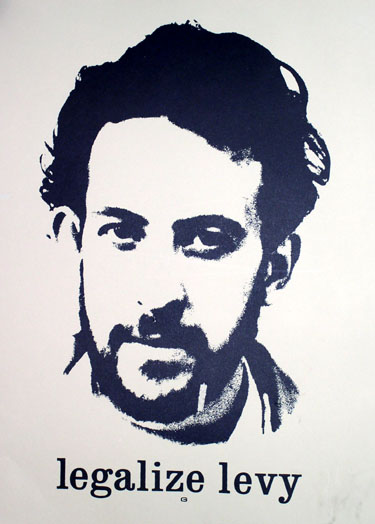
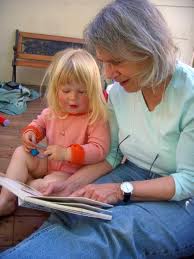
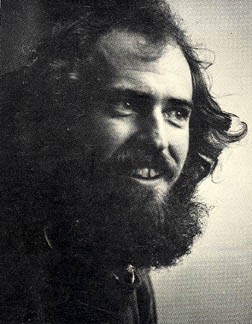
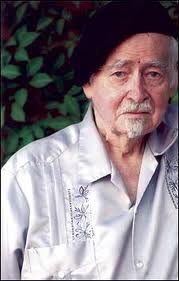
Enjoyed this. I especially liked the ones by d.a. levy and Donald Schenker. And I like the idea in general, to gather neglected poets in a collection. (One could fill many shelves with neglected ones, for sure.)
I second the nomination of Sharon Doubiago. A few others who come to mind offhand: William Witherup, Roy McBride, Sheryl Noethe, Thomas McGrath, Judy Grahn, Bert Meyers. The list could be a long one, but I don’t want to hog the space here.
Found your blog sometime during the past month or so, more or less stumbled across it. I particularly liked the blogpost about Joseph Campbell on Homer’s Odyssey, and the one ruminating on the origins of language. I’ll be back for more.
John —
Greetings from the mid-1990s. In re Mr. Grapes, one day thereabouts you typed all of “The Lost Things” into a post on BMUG and it has stayed with me ever since. Several times a year I find myself gathering Jack’s recollections of the winged cap of Mercury and his precious sleeping bag closely to myself. Your whim became a gift of decades. Thank you.
Best,
Sam
I guess I’m glad that you’re doing this, John, but the problem of our times in poetry is not so much neglected poets but neglected poetries. For instance, you have an entry on d. a. levy that doesn’t mention the thing he was most important for in poetry (I’d say, the only thing in poetry he was important for): visual poetry.
But keep going: there are hundreds of neglected poets out there for you to write about!
all best, Bob